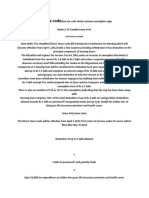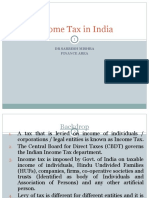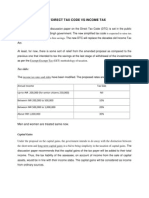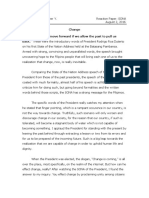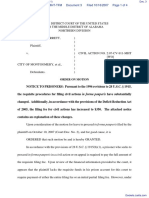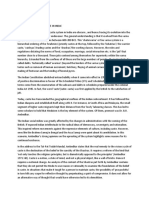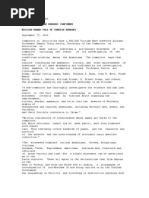Direct Tax Code (DTC) : Highlights and Impact
Direct Tax Code (DTC) : Highlights and Impact
Uploaded by
pramodvermalumba9710Copyright:
Available Formats
Direct Tax Code (DTC) : Highlights and Impact
Direct Tax Code (DTC) : Highlights and Impact
Uploaded by
pramodvermalumba9710Original Title
Copyright
Available Formats
Share this document
Did you find this document useful?
Is this content inappropriate?
Copyright:
Available Formats
Direct Tax Code (DTC) : Highlights and Impact
Direct Tax Code (DTC) : Highlights and Impact
Uploaded by
pramodvermalumba9710Copyright:
Available Formats
Direct Tax Code (DTC): Highlights and Impact
324 comments and 119,461 views Posted in Finance, Income Tax, India.
Email This Post The New Direct Tax Code (DTC) is said to replace the existing Income Tax Act of 1961 in India. DTC bill was tabled in parliament on 3oth August, 2010. There are big changes now in monsoon session and There are now much less benefits as compared to what were in the original proposal. During the budget 2010 presentation, the finance minister Mr. Pranab Mukherjee reiterated his commitment to bringing into fore the new direct tax code (DTC) into force from 1st of April, 2011, but same could not be fulfilled and now it will be applicable from 1st April, 2012.
Highlights of Direct Tax code
1. Removal of most of the tax saving schemes: DTC removes most of the categories of exempted income. Unit Linked Insurance Plans (ULIPs), Equity Mutual Funds (ELSS), Term deposits, NSC (National Savings certificates), Long term infrastructures bonds, house loan principal repayment, stamp duty and registration fees on purchase of house property will loose tax benefits. 2. New tax saving schemes: Tax saving based investment limit remains 100,000 but another 50,000 has been added just for pure life insurance (Sum insured is atleast 20 times the premium paid) , health insurance, mediclaims policies and tuition fees of children. But the one lakh investment can now only be done in provident fund, superannuation fund, gratuity fund and new pension scheme (NPS). 3. Tax slabs: The income tax rates and slabs have been modified. The proposed rates and slabs are as follows: Annual Income Up-to INR 200,000 (for senior citizens 250,000) Between INR 200,000 to 500,000 Tax Slab Nil 10%
Between INR 500,000 to 1,000,000 Above INR 1,000,000 Men and women are treated same now
20% 30%
4. Home loan interest: Exemption will remain same as 1.5 lakhs per year for interest on housing loan for self-occupied property. 5. Short and long term gains: Only half of Short-term capital gains will be taxed. e.g. if you gains 50,000, add 25,000 to your taxable income. Long term capital gains (From equities and equity mutual funds, on which STT has been paid) are still exempted from income tax. 6. EEE and EET: As per changes on 15th June, 2010, Tax exemption at all three stages (EEE) savings, accretions and withdrawalsto be allowed for provident funds (GPF, EPF and PPF), NPS (new pension scheme administered by PFRDA), Retirement benefits (gratuity, leave encashment, etc), pure life insurance products & annuity schemes. Earlier DTC wanted to tax withdrawals. 7. Education Cess: Surcharge and education cess are abolished. 8. Income arising from House Property: Deductions for Rent and Maintenance would be reduced from 30% to 20% of the Gross Rent. Also all interest paid on house loan for a rented house is deductible from rent. Before DTC, if you own more than one property, there was provision for taxing notional rent even if the second house was not put to rent. But, under the Direct Tax Code 2010 , such a concept has been abolished. 9. LTA (Leave travel allowance): Tax exemption on LTA is abolished. 10. Education loan: Tax exemption on Education loan to continue. 11. Corporate tax: Corporate tax reduced from 34% to 30% including education cess and surcharge. 12. Taxation of Capital gains from property sale : For sale within one year, gain is to be added to taxable salary. For long term gain (after one year of purchase), instead of flat rate of 20% of gain after indexation benefit, new concept has been introduced. Now gain after indexation will be added to taxable income and taxed at per the tax slab. Base date for cost of acquisition has been changed to 1st April, 2000 instead of earlier 1st April, 1981. 14. Medical reimbursement : Max limit for medical reimbursements has been increased to 50,000 per year from current 15,000 limit.
15. Tax on dividends: Equity mutual fund will attract 5% dividend distribution tax (DDT). DDT has been removed from debt and non-equity based mutual funds but now dividends on nonequity funds will be taxable in investors hand as per his slab rates. There will also be a TDS 0f 10% (20% in case of NRI and companies) if dividend is more than 10,000 Rs for non-equity funds. 15. News for NRIs : As per the current laws, a NRI is liable to pay tax on global income if he is in India for a period more than 182 days in a financial year. But in new bill, this duration has been changed to just 60 days. An NRI will be deemed as resident only if he has also resided in India for 365 days or more in the preceding four financial years, together with 60 days in any of these fiscal years. Even if an NRI becomes a resident in any financial year, his global income does not immediately become liable to tax in India. Global income would become taxable only if the person also stayed in India for nine out of 10 precedent years, or 730 days in the preceding seven years. This is very unfair to Seafarers. To avoid any income tax, an Indian sailor employed with a foreign ship will have to stay maximum for 60 days in India. Read more: http://www.pankajbatra.com/india/new-direct-tax-code-dtchighlights/#ixzz1cTw0VNsi
You might also like
- Purchase Order Agreement PDFDocument3 pagesPurchase Order Agreement PDFFaizan MehboobNo ratings yet
- Chapter 1 Partnership Formation Test BanksDocument49 pagesChapter 1 Partnership Formation Test BanksLizza Marie Casidsid90% (20)
- Exercises Management Accounting With AnswersDocument3 pagesExercises Management Accounting With AnswersNor Alem SampornaNo ratings yet
- US 116344 Facilitator Guide 1Document37 pagesUS 116344 Facilitator Guide 1Marius BuysNo ratings yet
- You Need To Be Logged-In To Download This File. Click Here To LoginDocument2 pagesYou Need To Be Logged-In To Download This File. Click Here To LoginSuchi PatelNo ratings yet
- Direct Tax CodeDocument2 pagesDirect Tax Codenikhilam.comNo ratings yet
- Direct Tax CodeDocument6 pagesDirect Tax Codeyzag66No ratings yet
- Direct Tax CodeDocument3 pagesDirect Tax CodeMeenu Mittal SinghalNo ratings yet
- Direct Tax CodeDocument5 pagesDirect Tax CodeNeha MaratheNo ratings yet
- Ulip Mutual Funds Elss: InvestmentDocument2 pagesUlip Mutual Funds Elss: InvestmentRajasekhar KollaNo ratings yet
- The New Direct Tax Code (DTC)Document18 pagesThe New Direct Tax Code (DTC)aggarwalajay2No ratings yet
- Direct Tax Code: Presented By: Anil Kakkar & Rakesh SarohaDocument13 pagesDirect Tax Code: Presented By: Anil Kakkar & Rakesh SarohaManish SharmaNo ratings yet
- Direct Tax CodeDocument13 pagesDirect Tax CodeNilesh ParekhNo ratings yet
- Direct Tax Code DTCDocument4 pagesDirect Tax Code DTCmanmit_kNo ratings yet
- Direct Tax Code: Taxation Presentation OnDocument22 pagesDirect Tax Code: Taxation Presentation OnVrinda KhannaNo ratings yet
- Income Tax India: Existing Act of 1961 inDocument5 pagesIncome Tax India: Existing Act of 1961 inNitranjan SinghNo ratings yet
- Changes in New Direct Tax Cod1Document10 pagesChanges in New Direct Tax Cod1Somit ParNo ratings yet
- Direct Tax CodeDocument5 pagesDirect Tax CodeSumit DaraNo ratings yet
- Direct Tax Code: Presented To: Prof. Kashmir SinghDocument21 pagesDirect Tax Code: Presented To: Prof. Kashmir SinghbrargurwantNo ratings yet
- DTC 2012 ProjectDocument10 pagesDTC 2012 ProjectSandeep SharmaNo ratings yet
- Direct Tax CodeDocument25 pagesDirect Tax CodeHk MeherNo ratings yet
- Direct Tax CodeDocument10 pagesDirect Tax CodeVarun TanejaNo ratings yet
- Impact On Direct Tax Code On Various Products: Tax Rules in IndiaDocument6 pagesImpact On Direct Tax Code On Various Products: Tax Rules in IndiamerijannatNo ratings yet
- New Tax Code: Times News NetworkDocument7 pagesNew Tax Code: Times News Networkkamalmodi13No ratings yet
- A Completely New and Revised Direct Tax Code: Salaried ClassDocument3 pagesA Completely New and Revised Direct Tax Code: Salaried ClassSandheep KumarNo ratings yet
- Article12-9nd August, 2010Document2 pagesArticle12-9nd August, 2010kishorek1212No ratings yet
- Direct Taxes Code: How You Are Affected!: Changes in Tax SlabsDocument2 pagesDirect Taxes Code: How You Are Affected!: Changes in Tax SlabsmisonokaraNo ratings yet
- DTC HighlightsDocument9 pagesDTC HighlightsAditi DugarNo ratings yet
- Direct Tax Code, Impact On Business and Merits & DemeritsDocument4 pagesDirect Tax Code, Impact On Business and Merits & DemeritsEMMANUELNo ratings yet
- DTC - FinalDocument18 pagesDTC - FinalvjranavjNo ratings yet
- The New Tax CodeDocument23 pagesThe New Tax CodePooja KunwarNo ratings yet
- Navdeep Tax CodeDocument26 pagesNavdeep Tax CodeHarinder BhaiaNo ratings yet
- Exemptions, Under Income Tex Act 1961Document4 pagesExemptions, Under Income Tex Act 1961sarkar260920No ratings yet
- Direct Tax 2010Document2 pagesDirect Tax 2010Shivam TiwariNo ratings yet
- Income Tax in IndiaDocument19 pagesIncome Tax in IndiaConcepts TreeNo ratings yet
- 7th Term - Legal Frameworks of ConstructionDocument79 pages7th Term - Legal Frameworks of ConstructionShreedharNo ratings yet
- 20 Highlights of The New Direct Tax Code Is Given BelowDocument2 pages20 Highlights of The New Direct Tax Code Is Given BelowsentvidNo ratings yet
- Finance IGNOU PDFDocument197 pagesFinance IGNOU PDFAakash BanjareNo ratings yet
- Income Tax ProjectDocument6 pagesIncome Tax Projectdipmoip2210No ratings yet
- Direct Tax Code 2010Document3 pagesDirect Tax Code 2010Shuja MehdiNo ratings yet
- Personal Exemptions: UK: Income Tax ExemptionsDocument4 pagesPersonal Exemptions: UK: Income Tax ExemptionsLuiza ŢîmbaliucNo ratings yet
- Taxation System in IndiaDocument5 pagesTaxation System in IndiaTanvi SanghaviNo ratings yet
- "Comparative Study of DTC (Direct Tax Code) Effective From 1april 2012." 1. IntroductionDocument11 pages"Comparative Study of DTC (Direct Tax Code) Effective From 1april 2012." 1. IntroductionAnurag GuptaNo ratings yet
- TaxationDocument5 pagesTaxationdartstockbrokingNo ratings yet
- Module 2 Taxes in IndiaDocument8 pagesModule 2 Taxes in Indiappamritha6No ratings yet
- Tax System in IndiaDocument18 pagesTax System in IndiaDEV HUGENNo ratings yet
- Amity Global Business School, PuneDocument15 pagesAmity Global Business School, PuneChand KalraNo ratings yet
- Govt Revenue Source Tax and Non TaxDocument11 pagesGovt Revenue Source Tax and Non TaxSumra KhanNo ratings yet
- Direct Tax CodeDocument16 pagesDirect Tax CodeSiddharth SharmaNo ratings yet
- Taxation in IndiaDocument9 pagesTaxation in IndiaSiva BalanNo ratings yet
- TaxDocument8 pagesTaxChozha RajanNo ratings yet
- PPP P PPPDocument25 pagesPPP P PPPRussel D'souzaNo ratings yet
- India Tax Structure 2011Document10 pagesIndia Tax Structure 2011wiesenerNo ratings yet
- 39.direct Tax Code Vs Income TaxDocument4 pages39.direct Tax Code Vs Income TaxmercatuzNo ratings yet
- Direct Tax CodeDocument10 pagesDirect Tax Codejgaurav80No ratings yet
- Anubhav Sood Helga Cardoza Ragini Rastogi Sumit Kothari Vani SubramanianDocument18 pagesAnubhav Sood Helga Cardoza Ragini Rastogi Sumit Kothari Vani SubramanianSakshi TewariNo ratings yet
- 12 DTC PresentationDocument19 pages12 DTC PresentationPunit BhandariNo ratings yet
- Exemption and Deduction in Income TaxDocument28 pagesExemption and Deduction in Income TaxManjunathNo ratings yet
- Tax Theory - 20231031 - 204225 - 0000Document10 pagesTax Theory - 20231031 - 204225 - 0000cherryop0321No ratings yet
- 10 Lesser Known Income Tax DeductionsDocument3 pages10 Lesser Known Income Tax DeductionsPrakash GuruswamiNo ratings yet
- Income Tax Saving SchemesDocument14 pagesIncome Tax Saving SchemesncldsvjliNo ratings yet
- Budget Summary 22nd June 2010Document7 pagesBudget Summary 22nd June 2010chris7899No ratings yet
- How to Reverse Recession and Remove Poverty in India: Prove Me Wrong & Win 10 Million Dollar Challenge Within 60 DaysFrom EverandHow to Reverse Recession and Remove Poverty in India: Prove Me Wrong & Win 10 Million Dollar Challenge Within 60 DaysNo ratings yet
- Lucio Javillonar For Oppositors and Appellants. Alejandro M. Panis For Applicants and AppelleesDocument19 pagesLucio Javillonar For Oppositors and Appellants. Alejandro M. Panis For Applicants and AppelleesbalunosarronNo ratings yet
- Change "We Cannot Move Forward If We Allow The Past To Pull Us Back." These Were The Introductory Words of President Rodrigo Roa DutertoDocument5 pagesChange "We Cannot Move Forward If We Allow The Past To Pull Us Back." These Were The Introductory Words of President Rodrigo Roa DutertoJoan PaynorNo ratings yet
- Niti AayogDocument24 pagesNiti Aayogshivam5singh-25No ratings yet
- Rahmat Setiawan 719412043Document10 pagesRahmat Setiawan 719412043iim tulNo ratings yet
- Commtest Ascent Software Reference GuideDocument411 pagesCommtest Ascent Software Reference GuideShakerNo ratings yet
- Jarrett v. City of Montgomery Et Al (INMATE 1) - Document No. 3Document4 pagesJarrett v. City of Montgomery Et Al (INMATE 1) - Document No. 3Justia.comNo ratings yet
- McFadden Lawsuit ComplaintDocument14 pagesMcFadden Lawsuit ComplaintMark FeuerbornNo ratings yet
- Persistence of Caste in IndiaDocument4 pagesPersistence of Caste in IndiaParnasha Sankalpita BhowmickNo ratings yet
- Flip Chip: 1 Process StepsDocument4 pagesFlip Chip: 1 Process StepsMayur AgarwalNo ratings yet
- Uses of Accounting Information and The Financial StatementsDocument15 pagesUses of Accounting Information and The Financial StatementsSweta KumariNo ratings yet
- 2024 - Course Materials - Law of ContractDocument14 pages2024 - Course Materials - Law of Contract2253401020309No ratings yet
- Apmp Proctoru FaqsDocument7 pagesApmp Proctoru Faqsgaurav.verma2806No ratings yet
- 1915-9-27 Tales of Armenian Horrors ConfirmedDocument3 pages1915-9-27 Tales of Armenian Horrors ConfirmedwhitemaleandproudNo ratings yet
- TSRGD PDFDocument186 pagesTSRGD PDFCJNo ratings yet
- World Trade OrganizationDocument122 pagesWorld Trade OrganizationmanpreetsinghmandayNo ratings yet
- HA Checklist 2020 Clinical InstructorsDocument37 pagesHA Checklist 2020 Clinical InstructorsMark Edrill ViñasNo ratings yet
- 1888 - Another LookDocument10 pages1888 - Another Lookwww.truthwarrior.de100% (2)
- 1961-Hammond-Land Tenure in Attica and Solons Seisachtheia-09Document24 pages1961-Hammond-Land Tenure in Attica and Solons Seisachtheia-09Andreas AntypasNo ratings yet
- Paper 1 Practice Paper Example AnswersDocument2 pagesPaper 1 Practice Paper Example AnswersEmma ChanNo ratings yet
- Unit 2Document14 pagesUnit 2Linh Trang Nguyễn ThịNo ratings yet
- Coup Reform-Resistance v.7Document4 pagesCoup Reform-Resistance v.7Sun Uday SunudayNo ratings yet
- ITW Slide Presentation Q1 2024 Earnings CallDocument10 pagesITW Slide Presentation Q1 2024 Earnings CallJairo NarvaezNo ratings yet
- 4th Certainty in TrustDocument8 pages4th Certainty in TrustPararaeNo ratings yet
- 25.0 - Driver Fatigue Prevention v3.1 EnglishDocument14 pages25.0 - Driver Fatigue Prevention v3.1 EnglishjbdejhiuhwNo ratings yet
- Rtca 275Document116 pagesRtca 275Sanjay Kumar DashNo ratings yet
- Kinds and Parts of A Business LetterDocument17 pagesKinds and Parts of A Business Lettergwynethbaluran0002No ratings yet























